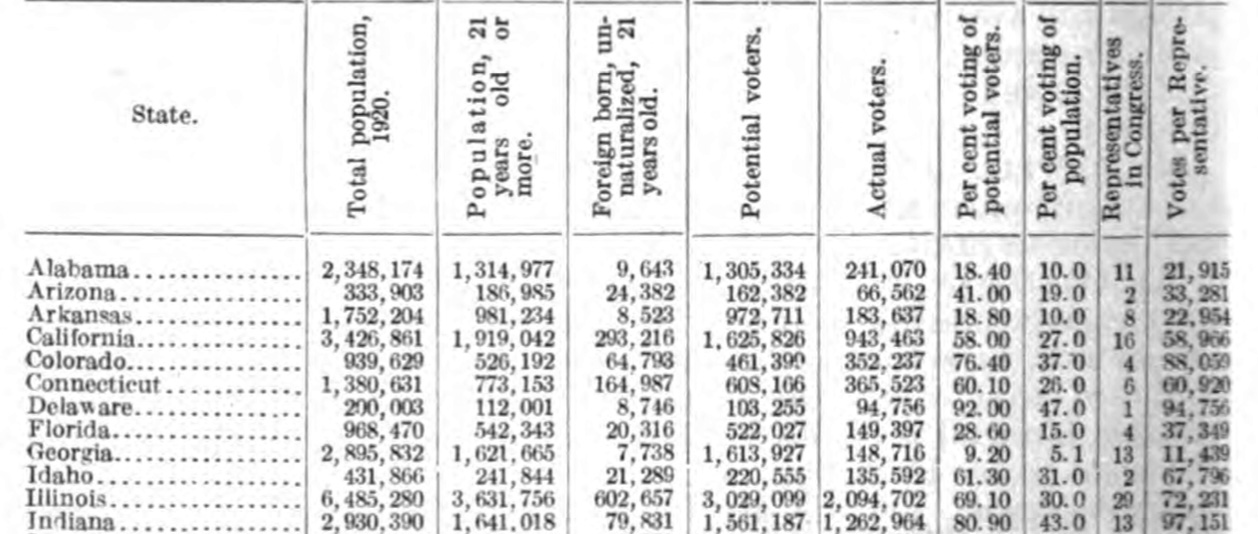Johnson appeared before the House Committee on the Census to demand constitutional justice. The Fourteenth Amendment of the U.S. Constitution granted equal citizenship to the formerly enslaved, and beyond that affirmed the citizenship of any and all persons born in the United States. It also repealed the infamous 3/5s clause, which had counted enslaved African Americans as only 3/5s of a person for the purposes of apportioning representatives in Congress or electors in Presidential contests. The second section of the Amendment began with this sentence:
Representatives shall be apportioned among the several States according to their respective numbers, counting the whole number of persons in each State, excluding Indians not taxed.
If I may be allowed to step out of the past for a moment and into our present: this is an inconvenient sentence for President Trump, who last week issued a memorandum declaring his intention that the apportionment figures transferred to Congress in 2021 should exclude “illegal aliens.” This despite the fact that the “whole number of persons” in the Constitution clearly includes all people who live, work, and build communities in the several states, without regard for their citizenship or immigration status. The administration’s order contravenes nearly a century of established presidential practices, as is made startlingly evident by this site by Taylor Savell and Kevin Ackermann.
Striking out the 3/5s clause credited Southern states fully for their Black inhabitants. States that had very recently been in open armed rebellion were to be granted substantially greater political power. To assure that those states’ Black residents had some say in their governance, section two continued with these lines:
But when the right to vote at any election for the choice of electors for President and Vice-President of the United States, Representatives in Congress, the Executive and Judicial officers of a State, or the members of the Legislature thereof, is denied to any of the male inhabitants of such State, being twenty-one years of age, and citizens of the United States, or in any way abridged, except for participation in rebellion, or other crime, the basis of representation therein shall be reduced in the proportion which the number of such male citizens shall bear to the whole number of male citizens twenty-one years of age in such State.
If states disfranchised otherwise eligible men, their representation could be reduced—or that’s what the Constitution now said. But that power had never been used up to the moment that Johnson sat before Congress.
At first, armed occupying forces from the North assured the voting rights of African Americans, and so this amending sentence had little purpose. By the mid-1870s, though, well-armed whites-only Democratic groups formed militias, overthrew or intimidated local Republican officials (who had been duly elected by Black and white voters), and terrorized Blacks in their churches or Republican club meetings, or when they came to the polls to vote. “Across the Deep South in the states where Republicans still had power,” writes historian Justin Behrend, “Democrats took notice of the ‘Mississippi Plan’ and the violence that ‘redeemed’ the state.” When even violence could not intimidate Black voters, the frustration of Blacks’ voting registration and outright vote fraud completed the job of stealing elections. After the 1876 bargain that handed the presidency to Rutherford B. Hayes, even Republican presidential administrations gave up on policing elections.
In the following two decades, when violence had failed to fully suppress Black political action, Southern states completed their coup by establishing whites-only primary elections and new voting restrictions based on literacy and a hefty poll tax. As Behrend writes, “Because of the persistence of black politics and freedpeople’s insistence throughout the 1880s that an open and grassroots democracy be restored, exasperated Democratic leaders turned to disfranchisement as the ultimate means to stifle freedpeople’s collective power.” White supremacy rose in final decade of the nineteenth century by stripping Blacks of the right to vote. Congress did nothing to protect the voting rights of African Americans, nor did it take away representatives from the States that had suppressed those rights.
 You are met with a practical, everyday question. We are standing on the crater of a volcano. How long can that situation go on?…It is a fact and the white light of truth beating on it is bound to reveal it. You have got to meet it with wisdom. Yet wisdom seemed to be in short supply in Congress.
You are met with a practical, everyday question. We are standing on the crater of a volcano. How long can that situation go on?…It is a fact and the white light of truth beating on it is bound to reveal it. You have got to meet it with wisdom. Yet wisdom seemed to be in short supply in Congress.